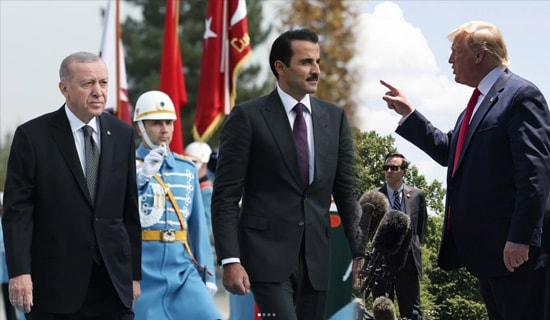In view of the historical developments taking place during this time in Turkey – developments that will determine the future of the Turkish republic, its relations with its neighbors in the region, and its positioning vis-à-vis, or its alignment with, the E.U. and the U.S. – MEMRI is announcing the launch of its Turkish Media Blog (www.thememriblog.org/turkey/).
The blog will provide firsthand primary-source material translated from the Turkish media – left, center, right, and Islamist, as well as original analyses.
One of the components of the Turkish Media Blog will be translations of speeches, interviews, sermons and segments from TV and movie programs in Turkish, found on youtube and other online video sites.
The MEMRI Turkish Media Blog will supplement MEMRI's Turkish Project's Special Dispatch and Inquiry & Analysis series.
Visit daily to see news before it appears anywhere else in the Western media.
The following are the most recent postings:
Palestinian Hijacker of Turkish Plane Linked to Al-Qaeda, 9/11
Turkish media reports indicate that the investigation of Mommen Abdul Aziz Talikh, the Palestinian who hijacked the AtlasJet passenger plane en route from Nicosia to Istanbul, showed that he had trained at Al-Qaeda camps. The investigation also revealed that Talikh had been in the same Saudi prison as a man called "Ahmed" who was serving a life sentence for helping to organize the 9/11 attacks. It is reported that Talikh and the second hijacker, Turkish national Mehmet Resat Ozlu, became friends in Cyprus and wanted to go to Afghanistan to join the jihadists there, and decided to hijack the plane to get to Iran first.
The reports also said that Talikh may have ties with some leading Al-Qaeda operatives.
Source: Haber 7, Turkey, August 19, 2007.
Turkish Energy Minister Visits Tehran For Final Touches On Energy Deal
Turkish Energy Minister Hilmi Guler is in Tehran conducting talks with his Iranian counterpart Parviz Fattah. It is reported that under the agreement, Turkey will build three thermal plants and dams in Iran. The two countries had signed a memorandum of understanding last month that will allow Iranian and Turkmen natural gas to be exported to Europe via Turkey. While European countries consider the deal to be an alternative that may alleviate Europe's energy dependency on Russian exports, the U.S. has expressed strong opposition to the Turkey-Iran energy deal.
Source: Zaman, Turkey, August 20, 2007.
Abdullah Gul Wed Wife When She Was 15
Today begins the first round of the presidential election in Turkey. It also is the wedding anniversary of presidential candidate Abdullah Gul and his wife Hayrunnisa. The couple wed in 1980, when he was 30 and she was 15.
Gul’s mother had spotted the girl at a wedding in Kayseri and chosen her for her son, and the two were wed soon after. At the time, Hayrunnisa was in high school and did not cover her head. She left school and began to cover herself in the Islamic fashion.
Many Turks today ask whether Mrs. Gul could have exercised her own free will to cover herself at that young an age, and what kind of role model she would be as First Lady for so many young Turkish girls who are still forced into early marriages and are subject to similarly imposed lifestyles.
Source: Milliyet, Turkey, August 20, 2007.
PM Erdogan: Poor Comparison Between Mrs. Gul, Mrs. Ataturk
Turkish Prime Minister Recep Tayyip Erdogan has said that "those who oppose Mrs. Gul’s turban should look at photos of Ataturk’s mother and wife, who also covered their heads, and should learn their lesson.”
The comparison caused a major stir in Turkey. The mainstream Turkish media called Erdogan’s remarks an intentional distortion of facts, or, at best, a sign of his ignorance, pointing out that Ataturk’s mother died in 1923, before the modern republic was founded, and that Ataturk's wife Latife Hanim was a modern and independent woman who had studied law in Paris and London. Additionally, she did not cover her head either before or after her marriage to Ataturk, which lasted about two years and ended in divorce in 1925. She only covered her head when she joined her husband in his domestic travels, to avoid conflict with the Islamist circles of the time.
The media noted that it must be remembered that Ataturk’s reforms, which removed the veil and hijab and westernized attire in Turkey, came in November 1925 and December 1932, after the couple’s divorce.
Source: Aksam, Milliyet, Hurriyet, Turkey, August 17, 2007.
Risotto With Wine Cost Turkish Governor His Job
The mainstream Turkish media has reported that following a meeting last month with Turkish Interior Ministry bureaucrats at a Mediterranean resort town in Mugla, Turkish Interior Minister Osman Gunes and the other participants attended a luncheon at a luxury hotel, hosted by Mugla Governor Temel Kocaklar.
Gunes enjoyed the risotto at the meal so much he asked the chef for the recipe, but when he was told that half a cup of wine was added to the risotto, the minister flung his plate away and shouted at the governor for making him sin by eating a dish containing alcohol, which is forbidden in Islam.
The governor’s apologies and all his efforts to calm the minister did not help.
Five days later Governor Kocaklar received a fax from the interior ministry withdrawing him from his position in Mugla.
While experts on Islam are debating what one should do when one unknowingly consumes haram (i.e. forbidden) alcohol, the staunchly secular Turkish President Ahmet Necdet Sezer appointed Kocaklar as a member of the High Administrative Court (Danistay), one of the last appointments he made, before leaving office.
Source: Vatan, Turkey, August 18, 2007.
Survey Finds Turkey Islamized; For 83% of AKP Voters, Women Wearing Swimsuits Is Sinful
A recent poll by Professor Yilmaz Esmer from Bahcesehir University, Turkey, aimed at identifying the behavior and preferences of the Turkish electorate in the July 22 elections, confirmed that religion was a critical element dividing the AKP and CHP electorates.
In response to a question on whether religious books or scientific findings and inventions were more helpful in understanding the world and the universe, 59% of the AKP electorate chose religious "books," while 84% of the CHP voters said "science."
In answer to the question "Is it sinful for a woman to wear a swimsuit at beaches and swimming pools?" 83% of AKP voters, 63% of MHP voters and 14% of CHP voters said yes.
When asked how important it was for the Turkish president to be religious, 60% of the combined electorate said it was "very important."
In response to the question "Should restaurants and eateries be open in the daytime during Ramadan, or should they close until the iftar (evening meal to break the fast)," 53% of AKP voters, 30% of MHP voters, and 12% of CHP voters answered that they should be closed.
The poll found that 25% of Turkish electorate does not know whether or not Turkey is a member of the EU, and 62% of Turks knew that Turkey is a member of the U.N.
As to who was the presidential candidate of their choice, among the 100 names that emerged, 48% of the combined electorate said ‘Gul,’ followed by 6% for Sezer.
When asked to grade their party’s leader on a scale of 1 to 10, Erdogan got 9.31 from AKP voters and Bahceli 8.01 from MHP electorate. Baykal was graded 5.27 by CHP voters.
Prof. Esmer said the Turkish electorate did not vote rationally, but chose the party first and appreciated its policies later, he said.
Source: Milliyet, Turkey, August 18, 2007.
Gul Did Not Win In The First Round Of The Vote
The first round of the vote of presidential election in the Turkish parliament just ended. Abdullah Gul did not get elected in the first round, which required 367 votes. The second round will be held August 24. Ninety-nine CHP MPs and two independents boycotted the vote and did not participate.
Gul received 341 votes, while the MHP’s Cakmakoglu received 70, and Tufan Icli received 13, all from their own parties. Members of the Kurdish DTP participated but did not vote for any candidate.
Source: Kanalturk TV, Turkey, August 20, 2007.
Islamists Protest TV Series For Dog Character Named ‘Huseyin’
The radical Islamist Turkish daily Vakit reported that crowds in mosques are protesting against Kanal-D TV for broadcasting a TV series that includes a dog character named Huseyin. The Prophet Muhammad's grandson was named Huseyin.
Hundreds of angry protestors gathered in front of the Kanal-D offices, and laid a black wreath in protest. They chanted, 'Ali is our soul and blood, we are all Huseyin, we'll break the hands that extend to our Prophet Muhammed, we are ready to die for Islam."
Kanal D has already apologized and said that it understands the sentiments of the protesters, and promised to take all the necessary steps.
The Turkish daily Tercuman headlined the story.
Source: Vakit, Tercuman, Turkey, August 20, 2007.




.jpg)